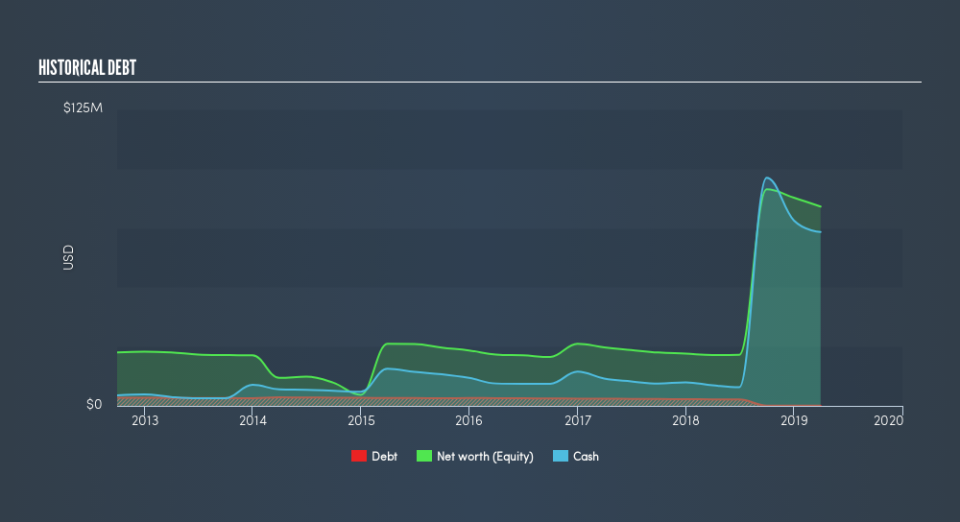Apyx Medical (NASDAQ:APYX) May Be Weighed Down By Its Debt

Legendary fund manager Li Lu (who Charlie Munger backed) once said, 'The biggest investment risk is not the volatility of prices, but whether you will suffer a permanent loss of capital.' When we think about how risky a company is, we always like to look at its use of debt, since debt overload can lead to ruin. We note that Apyx Medical Corporation (NASDAQ:APYX) does have debt on its balance sheet. But should shareholders be worried about its use of debt?
When Is Debt Dangerous?
Debt is a tool to help businesses grow, but if a business is incapable of paying off its lenders, then it exists at their mercy. Part and parcel of capitalism is the process of 'creative destruction' where failed businesses are mercilessly liquidated by their bankers. While that is not too common, we often do see indebted companies permanently diluting shareholders because lenders force them to raise capital at a distressed price. By replacing dilution, though, debt can be an extremely good tool for businesses that need capital to invest in growth at high rates of return. The first step when considering a company's debt levels is to consider its cash and debt together.
Check out our latest analysis for Apyx Medical
What Is Apyx Medical's Net Debt?
As you can see below, Apyx Medical had US$140.0k of debt at March 2019, down from US$2.77m a year prior. However, it does have US$73.3m in cash offsetting this, leading to net cash of US$73.2m.
A Look At Apyx Medical's Liabilities
According to the last reported balance sheet, Apyx Medical had liabilities of US$7.48m due within 12 months, and liabilities of US$215.0k due beyond 12 months. On the other hand, it had cash of US$73.3m and US$4.93m worth of receivables due within a year. So it actually has US$70.5m more liquid assets than total liabilities.
This surplus strongly suggests that Apyx Medical has a rock-solid balance sheet (and the debt is of no concern whatsoever). On this basis we think its balance sheet is strong like a sleek panther or even a proud lion. Succinctly put, Apyx Medical boasts net cash, so it's fair to say it does not have a heavy debt load! When analysing debt levels, the balance sheet is the obvious place to start. But ultimately the future profitability of the business will decide if Apyx Medical can strengthen its balance sheet over time. So if you're focused on the future you can check out this free report showing analyst profit forecasts.
In the last year Apyx Medical managed to grow its revenue by 265%, to US$19m. When it comes to revenue growth, that's like nailing the game winning 3-pointer!
So How Risky Is Apyx Medical?
By their very nature companies that are losing money are more risky than those with a long history of profitability. And in the last year Apyx Medical had negative earnings before interest and tax (EBIT), truth be told. And over the same period it saw negative free cash outflow of US$25m and booked a US$11m accounting loss. While this does make the company a bit risky, it's important to remember it has net cash of US$73m. That means it could keep spending at its current rate for more than two years. Importantly, Apyx Medical's revenue growth is hot to trot. High growth pre-profit companies may well be risky, but they can also offer great rewards. When we look at a riskier company, we like to check how their profits (or losses) are trending over time. Today, we're providing readers this interactive graph showing how Apyx Medical's profit, revenue, and operating cashflow have changed over the last few years.
Of course, if you're the type of investor who prefers buying stocks without the burden of debt, then don't hesitate to discover our exclusive list of net cash growth stocks, today.
We aim to bring you long-term focused research analysis driven by fundamental data. Note that our analysis may not factor in the latest price-sensitive company announcements or qualitative material.
If you spot an error that warrants correction, please contact the editor at editorial-team@simplywallst.com. This article by Simply Wall St is general in nature. It does not constitute a recommendation to buy or sell any stock, and does not take account of your objectives, or your financial situation. Simply Wall St has no position in the stocks mentioned. Thank you for reading.

